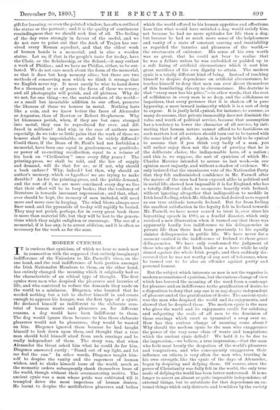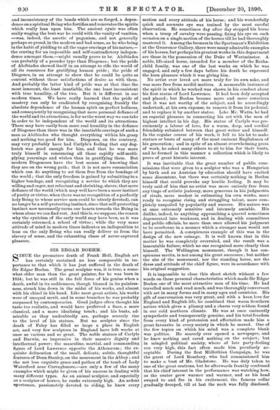MODERN CYNICISM.
IT is curious that cynicism, of which we hear so much now in connection with the supposed (but entirely imaginary) indifference of the Unionists to Mr. Parnell's vices, on the one hand, and the real indifference of both parties amongst the Irish Nationalist Members to them, on the other hand, has entirely changed the meaning which it originally had as the characteristic of an ethical type of thought. The first cynics were men who despised the pleasures and luxuries of life, and who contrived to reduce the demands they made on the world to a minimum. Diogenes, who boasted that he needed nothing but a tub to shelter himself in and crusts enough to appease his hunger, was the first type of a cynic. He declared himself as indifferent to the elaborate sum- total of human wants and pleasures as, for different reasons, a dog would have been indifferent to them. The dog would ignore them because to him these elaborate pleasures would not be pleasures ; they would be wasted on him. Diogenes ignored them because he had taught himself to look down upon them, and thought that a true man should hold himself aloof from such cravings and be really independent of them. The story was, that when Alexander the Great asked him what he could do for him, Diogenes answered curtly : " Stand out of my light, and let me feel the sun." In other words, Diogenes taught him- self to despise the vanity and the eagerness of human wishes, and to shake himself loose of the world, much as the monastic orders subsequently shook themselves loose of the world, though without their overmastering motive. The ancient cynic was a man whose pride was cultivated till it trampled down the moat imperious of human desires. He learnt to despise the multifarious pleasures and bribes
which the world offered to his human appetites and affections. Less than what would have satisfied a dog, would satisfy him, not because he had no more aptitudes for life than a dog, but because he bad so much more sense of the helplessness and vanity of a state of constant craving and insatiability as regarded the luxuries and pleasures of the world,-- the sweetmeats of existence. His sense of his own worth was so great, that he could not bear to realise that he was a failure unless he was embedded or padded up in a soft lining of artificial circumstance which it cost him great sacrifices of his own dignity to attain. The modern cynic is a totally different kind of being. Instead of teaching himself to despise dependence on artificial circumstance, he teaches himself to deny that men can ever divest themselves of this humiliating slavery to circumstance. His doctrine is that " every man has his price,"—in other words, that the root of selfishness in every man is so deep, and the selfishness so imperious, that every pretence that it is shaken off is pure hypocrisy, a mere inward insincerity which it is a sort of duty to expose. It is justly held cynical, for instance, to assume, as many do assume, that private immorality does not diminish the value and worth of political service, because that assumption has a tendency to lower the character of all service, by inti- mating that human nature cannot afford to be fastidious on such matters lest all services should turn out to be tarred with the same kind of pitch. Again, it is justly held to be cynical to assume that if you think very badly of a man, you will rather enjoy than not the duty of proving that he is the deliberate choice, the indispensable hero, of a nation ; and this is, we suppose, the sort of cynicism of which Mr. Charles Maurice intended to accuse us last week,—in our opinion most unjustly, and without a shadow of evidence. We only insisted that the unanimous vote of the Nationalist Party that they felt undiminished confidence in Mr. Parnell after the nature of the man had been exposed alike in political and in social life, showed how impossible it is for England, who has a totally different ideal, to co-operate heartily with Ireland, without ignoring altogether that indisposition to meddle in Irish local feeling, which Mr. Gladstone had desired us to regard as our true attitude towards Ireland. But far from feeling the smallest satisfaction in the loyalty felt in Ireland towards Mr. Parnell, we have never ceased to treat it, ever since his boycotting speech in 1880, as a fearful disaster, which only received a new illustration when it turned out that there was apparently hardly less indifference to his delinquencies in private life than there had been previously to his equally sinister delinquencies in public life. We have never for a moment exulted in the indifference of Ireland to these grave delinquencies. We have only condemned the judgment of those who spoke of the Irish leader as a hero while he only sinned against the whole Irish people, and then suddenly dis- covered that he was not worthy of any sort of tolerance, when he turned out to be also an offender against purity and personal honour.
But the subject which interests us now is not the vagaries in modern accusations of cynicism, but the curious change of view which has lowered the meaning of the word from a contempt for pleasure and an indifference to the gratification of desire, to a disposition to deny that any one is in anT,■.degree independent of pleasure and of the gratification of desire. The ancient cynic was the man who despised the world and its enjoyments, and showed that he despised them. The modern cynic is the man who gives the world and its enjoyments credit for subduing and subjecting the souls of all men to the dominion of those cravings which exert so tyrannical a sway over us. How has this curious change of meaning come about ? Why should the modern cynic be the man who exaggerates the power of the very same class of wants and temptations which the ancient cynic defied ? We hold it to be due to the impression,—we believe, a true impression,—that the man who feels most keenly the despotism of the world's pleasures and temptations, and who consequently exaggerates their influence on others, is very often the man who, trusting in his own strength, like the cynic of the days of Alexander, began by despising and defying them. Of course, since the power of Christianity was fully felt in the world, the only true mode of defying the world has been better understood. It is no' longer to assert an almost or quite impossible independence of external things, but to substitute for that dependence on ex- ternal things which only distracts and bewilders by the variety and inconsistency of the bonds which are so forged, a depen- dence on a spiritual Being who fortifies and renovates the spirits which really lean upon him. The ancient cynic was often really waging the beat war he could with the vanity of vanities, —was, indeed, the ascetic of paganism, and not generally perhaps so proud, in the modern and bad sense, as he who being lathe habit of yielding to all the eager cravings of his nature,— the craving for an impossible and self-contradictory indepen- dence amongst them,—might usually prove to be. Alcibiades -was probably of a prouder type than Diogenes ; but the pride of Alcibiades showed itself in an attempt to rifle the world of all its resources for gratifying human pride ; the pride of Diogenes, in an attempt to show that he could be quite as content without those satisfactions of desire as with them. And probably the latter kind of pride was at that time the most innocent, the least insatiable, the one least inconsistent with true humility, of the two. But it is different in our -modern times. We have really learned that the pride of -mastery can only be eradicated by recognising frankly the absolute dependence of the human spirit on perfect holiness, and consequently by recognising that mere personal defiance of the world and its attractions, is for us the worst way we can take in order to be independent of the world and its attractions. There may have easily been more real humility in the defiance of Diogenes than there was in the insatiable cravings of such a man as Alcibiades who thought everything within his grasp and nothing too good for him. Diogenes, on the contrary, may very probably have had Carlyle's feeling that any dog- hutch was good enough for him, and that he was more truly himself in renouncing all these rapidly self-multi- -plying yearnings and wishes than in gratifying them. But -modern Diogeneses have the best means of knowing that they are on the wrong path ; that it is not mere renunciation -which can do anything to set them free from the bondage of the world ; that the only freedom is gained by submitting to a higher bondage, and recognising a service to which they are willing and eager, not reluctant and shrinking, slaves; that mere defiance of the world (which may well have been a mere instinct -of purity or virtue, when there was no recognition of a perfectly holy Being to whose service men could be utterly devoted), can no longer be a self-protecting instinct, since that self-protecting instinct now necessarily turns our hearts towards the Being in whom alone we can find rest. And this is, we suppose, the reason why the cynicism of the early world may have been, as it was certainly esteemed, a school of virtue ; while the very same -attitude of mind in modern times indicates an indisposition to lean on the only Being who can really deliver us from the slavery of sense, and the exhausting chase of never-captured pleasure.











































 Previous page
Previous page